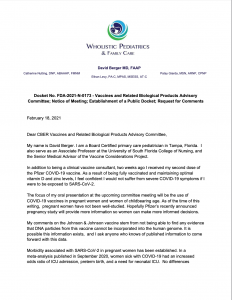The FDA Vaccines and Related Biological Products Advisory Committee will meet February 26, 2021 to discuss the Emergency Use Authorization (EUA) of the Johnson & Johsnon/Jansenn Biotech, Inc. COVID-19 Vaccine. Dr. David was invited to give an oral presentation at the committee meeting, and he submitted the following written comments in advance of that presentation.
Docket No. FDA-2021-N-0173 – Vaccines and Related Biological Products Advisory Committee; Notice of Meeting; Establishment of a Public Docket; Request for Comments
February 18, 2021
Dear CBER Vaccines and Related Biological Products Advisory Committee,
My name is David Berger. I am a Board Certified primary care pediatrician in Tampa, Florida. I also serve as an Associate Professor at the University of South Florida College of Nursing, and the Senior Medical Advisor of the Vaccine Considerations Project.
In addition to being a clinical vaccine consultant, two weeks ago I received my second dose of the Pfizer COVID-19 vaccine. As a result of being fully vaccinated and maintaining optimal vitamin D and zinc levels, I feel confident I would not suffer from severe COVID-19 symptoms if I were to be exposed to SARS-CoV-2.
The focus of my oral presentation at the upcoming committee meeting will be the use of COVID-19 vaccines in pregnant women and women of childbearing age. As of the time of this writing, pregnant women have not been well-studied. Hopefully Pfizer’s recently announced pregnancy study will provide more information so women can make more informed decisions.
My comments on the Johnson & Johnson vaccine stem from not being able to find any evidence that DNA particles from this vaccine cannot be incorporated into the human genome. It is possible this information exists, and I ask anyone who knows of published information to come forward with this data.
Morbidity associated with SARS-CoV-2 in pregnant women has been established. In a meta-analysis published in September 2020, women sick with COVID-19 had an increased odds ratio of ICU admission, preterm birth, and a need for neonatal ICU. No differences occurred in terms of maternal mortality, necessity of C-section, stillbirth, neonatal death, or fetal distress.1
Ongoing hesitancy relative to COVID-19 vaccines continues. According to the Kaiser Family Foundation (KFF) COVID-19 Vaccine Monitor: 28% of people age 18-29, and 36% of people age 30-49, would probably or definitely not take a COVID-19 vaccine even once determined safe by scientists and available free of charge to the general public.2 Multiple polls have shown women are 6-18% more likely to have vaccine hesitancy than men.3 This suggests a large number of women of child-bearing age have COVID-19 vaccine hesitancy.
The hesitancy among women of childbearing age likely increased due to conflicting statements from the World Health Organization (WHO), Centers for Disease Control and Prevention (CDC), and American College of Obstetricians and Gynecologists (ACOG) regarding recommendations for COVID-19 vaccines in pregnant women. Initially, last month the WHO advised women to not take mRNA-containing vaccines unless they are listed among the groups at higher risk for contracting/suffering from COVID-19 (e.g, healthcare/frontline workers, certain medical conditions, etc.). In contrast, the CDC and ACOG guidance suggested a pregnant woman can receive a vaccine if the woman chooses to do so. A few days later the WHO back-tracked its guidance to be more aligned with the CDC and AGOG.4
Many people are now starting to learn the difference between virus-vector DNA and mRNA vaccines. Both types of vaccines work by presenting messenger RNA to ribosomes in the cytoplasm to produce spike protein, which enables the immune system to better fight the virus on future exposures. However, with mRNA vaccines, the genetic material never enters the nucleus. DNA from a virus-vector DNA vaccine enters the nucleus to allow for the production of the mRNA, which is then released into the cytoplasm.
Though colleagues and other experts have informed us there is no evidence DNA from a virus-vector DNA vaccine can be incorporated into the human genome, my research team and I have found no evidence that it does not. I will continue to seek more information about this concern over the next week, and look forward to sharing my findings with you on February 26th.
Since there are mRNA vaccines that do not bring DNA into the nucleus of cells, women who wish to get a COVID-19 vaccine have an option to not be exposed to this theoretical risk. This could be of particular importance in a developing zygote/fetus. As a result, unless it is certain this risk is not possible, I am advising the FDA to act out of an abundance of caution by not authorizing the use of DNA-containing COVID-19 vaccines for use in pregnant women and women of childbearing age. This restriction on the authorization of the Johnson & Johnson COVID-19 vaccine should remain until some level of scientific evidence shows the DNA can not be incorporated into the fetal genome. If the decision is made to authorize the use of the Johnson & Johnson COVID-19 in women of child-bearing age, please provide appropriate warnings so women are aware of this potential risk prior to them providing informed consent.
Sincerely,

David Berger, MD, FAAP
Board Certified Pediatrician
Owner and Medical Director, Wholistic Pediatrics & Family Care
Assistant Professor, University of South Florida College of Nursing
3405 W Fletcher Avenue
Tampa, FL 33618
(813) 960-3415
- https://www.bmj.com/content/370/bmj.m3320
- https://www.kff.org/coronavirus-covid-19/report/kff-covid-19-vaccine-monitor-december-2020/
- https://www.washingtonpost.com/lifestyle/style/women-covid-vaccine-skeptical/2020/12/15/63551cac-3a61-11eb-9276-ae0ca72729be_story.html
- https://www.nytimes.com/2021/01/29/health/covid-vaccine-pregnancy.html
DOWNLOAD DR. DAVID’S LETTER HERE:

